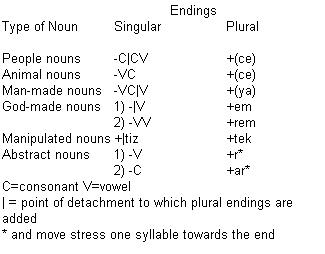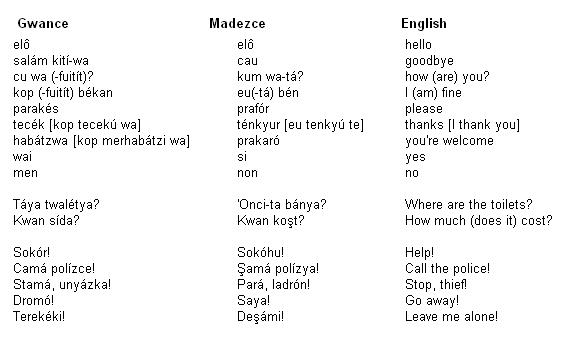Difference between revisions of "Gwance"
Lilgrexicano (Talk | contribs) (→Orthography) |
Lilgrexicano (Talk | contribs) (→Guanche (Gwance) Phrasebook) |
||
| Line 64: | Line 64: | ||
| − | == | + | == Jaziraati Phrasebook == |
| − | + | [[Image:Jaziraati_Phrasebook.jpg]] | |
| − | + | ||
| − | + | ||
Revision as of 15:54, 12 June 2006
This misterious language cannot find its place in the taxonomy of human languages. It seems to share characteristics with the languages from different families, as well as novel constructs. Influences in the lexicon from Arabic, Greek, Spanish, and Portuguese are evident.
The task of standardizing the language was not an easy one. Each island maintains its distinct dialect of Guanche. The accepted "standard" is fabricated out of the Tenerife and Kanariakbire dialects. These two are the most widely spoken, and most intelligeable amongst the speakers of the surrounding islands.
Unfortunately, the inhabitants of Madeira and Pursante do not speak Guanche natively. However, they can acquire the standard fairly easily.
History
Guanche is the official language of Jaziraat with roots still linguistically undeterminate. The base language, "proto-Guanche", is believed to have been spoken by the original inhabitants of the Altas mountains, prior to the arrival of Berber speaking peoples. Eventually, as they were pushed to the fringe, towards the coasts of western Morocco, Western Sahara, Mauritania, and inevitably across the open sea to the Canary Islands. Over time, the Guanche languages became particular to each island and community, showing vast variation and usage.
On the island of Tenerife, the Guanche language of today became the popular language. In 1342, Mencey Pabliozkif united the segmented kingdoms of the island, and promoted literacy and education. With this came the emergence of a strong linguistic instrument, which spread to the other islands over the next 150 years. When the Spanish arrived and conquered the islands, undoubtedly, their language infused with Guanche, as was the case with Portuguese on Madeira. Still, the grammatical roots of Guanche are almost unchanged since the fourteenth century, when royal grammaticians printed the first language codex for Guanche.
Orthography
Long gone are the days when a primitive North African script was used. Modern Guanche employs the Latinate alphabet, and follows the spelling of Spanish (and Portuguese in Madeira), with slight midification (the use of "k" in place of "c", "ky" instead of "qu", etc.). However, linguists at the National Center for Guanche Studies are mulling over the idea of introducing a new alphabet, one that reflects the needs of the Guanche language. This proposed alphabet would prove a radical change for the nation, and is included here:
Alpabet Jedkin Gwance (New Guanche Alphabet)
Aa Bb Cc Dd Ee Ff Gg Hh Ii Jj Kk Ll Mm Nn Oo Pp Rr Ss Şş Tt Uu Ww Yy Zz
[a] [b] [ʧ] [d] [ɛ] [ɸ] [g] [h] [i] [ʒ] [k] [l] [m] [n] [o] [p] [r] [s] [ʃ] [t] [u] [w] [j] [z]
- Note: ɸ represents the sound of a heavily aspirated [f] sound, produced with tight, rounded lips. Similar to Japanese "fu".
Grammar
Nouns are systematically segregated according to their nature in the world and their relationship to mankind:

Examples:
Type 1 (People nouns): guanka (islander) > guanche (islanders), guantipli (priest)> guantipche (priests), trigumki (sailor) > trigumche (sailors)
Type 2 (Animal nouns): anzen (animal) > anzenche, zurpan (monkey)> zurpanche, kilpan (dog) > kilpanche
Type 3 (Man-made nouns): trimaki (ship) > trimakya, sorota (pot) > sorotya
Type 4 (God-made nouns): bukra (rock) > bukrem, eltua (island) > eltuarem, stana (wave) > stanem, zile (wood) > zilerem
Type 5 (Manipulated nouns): eltuatiz (artificial island) > eltuatek, ziletiz (lumber) > ziletek
Type 6 (Abstract nouns): beltanzi (knowledge) > beltanzir, korta (power) > kortar, samehfui (ability) > samehfuir, nazin (time) > nazinar, puenche (love) > puencher

